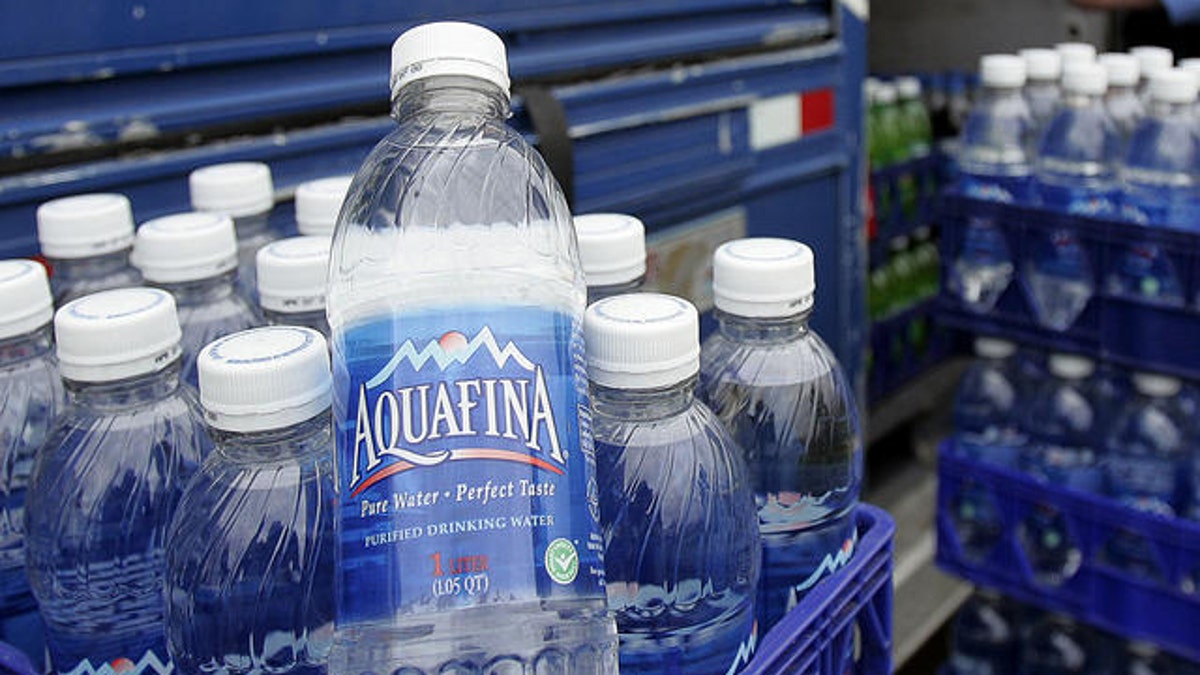
Pepsico delivery man Nick Jones unloads Aquafina water and other Pepsi products while makiing a delivery in Tualatin, Ore., Wednesday, April 26, 2006. PepsiCo Inc., the world's No. 2 soft-drink maker and owner of snack-maker Frito-Lay, on Wednesday said first-quarter profit jumped as revenue across all its divisions grew, aided by a growth in sales of snacks and beverages marketed as healthier fare.(AP Photo/Don Ryan) (AP)
The federal government is moving to crack down on a bizarre form of food-stamp fraud that's flushing away taxpayer dollars.
The scam is called "water dumping." It works as follows: Food stamp recipients use their benefits to purchase water bottles and from there promptly dump the water out and redeem the bottles for cash.
It takes dedication to make any measurable profit off this. But it is a waste of water and a waste of taxpayer resources, not to mention an abuse of the "bottle deposit" system. And the Department of Agriculture is trying to put a stop to it.
Under a proposed rule, the government would treat "water dumping" as a trafficking offense and be allowed to disqualify from the food-stamp rolls anybody caught doing it. The comment period ended Friday, and the USDA is looking to finalize the rule by the end of the year.
"They're clearly abusing the program, and that's just not tolerable to us," USDA spokeswoman Jean Daniel said.
The fraud is difficult to track, as officials have to rely on store owners and vigilant citizens to report it to authorities. Daniel said she couldn't put a figure on how much the scam has cost the food stamp program, though she noted it's concentrated in a handful of states.
"I wouldn't say this is a nationwide problem costing a bazillion dollars, but it's an egregious enough abuse of the program that we wanted to be able to punish the people who are doing this," Daniel said. She said people have been known to dump out other beverages too, from milk to soda, just to redeem the bottle value.
"These situations negatively impact program integrity and divert benefits intended to meet the dietary needs of the nation's neediest citizens," the USDA said in its proposal.
Meanwhile, the abuse is still happening. Over the weekend in Maine, a local woman recorded a couple pouring out water bottles outside a Shaw's grocery store. The video was posted online by the Bangor Daily News.
Sgt. Paul Edwards, with the Bangor Police Department, confirmed that the couple bought about $6 worth of bottled water, and then dumped it out before returning the containers in exchange for $2.40 in cash. The case was referred to the state attorney general's office.
Edwards told FoxNews.com the scam is not new. "We get 'em once in awhile," he said. "They get $2.40 and get a 40-ounce of beer and off they go."
Maine is one of 13 states that have a container deposit law. Under such laws, customers pay a deposit for beverage containers and can get that deposit refunded if they return the containers. Deposits typically range from 5 to 15 cents.
Food stamp benefits cover the cost of the deposit since the container is not optional.
But some questioned why the food stamp program was covering bottled water in the first place. Kristin Urquiza, director of the anti-bottled water "Think Outside the Bottle" campaign for Corporate Accountability International, said that while water should be made available to everyone, "this issue raises questions about whether a product like bottled water should be eligible under the (food stamp) program at all." She said public dollars should be used to reinvest in tap water systems that serve everyone instead of footing the bill for bottled water.
While some abuse the system, record numbers of people are now enrolled in the food stamp program, formally called the Supplemental Nutrition Assistance Program. The latest report from the Agriculture Department showed nearly 46 million people -- or one in seven Americans -- were enrolled as of May.
"At a time when so many Americans are coping with economic hardship, we need to do everything possible to ensure that all SNAP benefits are used only as intended -- to help struggling individuals and families put healthy food on the table," Kevin Concannon, undersecretary for Food, Nutrition and Consumer Services, said in a statement earlier this year.




